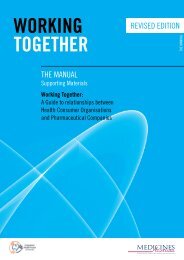Coping with persistent pain - Chronic Pain Australia
Coping with persistent pain - Chronic Pain Australia
Coping with persistent pain - Chronic Pain Australia
Create successful ePaper yourself
Turn your PDF publications into a flip-book with our unique Google optimized e-Paper software.
Medicines for <strong>persistent</strong> <strong>pain</strong><br />
How you cope best <strong>with</strong> <strong>persistent</strong> <strong>pain</strong> is highly personal. Many people<br />
<strong>with</strong> <strong>persistent</strong> <strong>pain</strong> are able to manage adequately <strong>with</strong>out medicines.<br />
Others find that they function better, are more comfortable and have<br />
a better overall quality-of-life, when they take medicines.<br />
Medicines include prescription medicines, medicines bought<br />
over-the-counter in pharmacies (chemists) or supermarkets and<br />
herbal and natural medicines.<br />
The role of medicines is not to ‘cure’ the <strong>pain</strong>, but to lessen the<br />
<strong>pain</strong> and improve your functionality and quality-of-life. Even the strongest<br />
medicines for <strong>pain</strong> will not always completely eliminate it, but they<br />
can reduce the severity of <strong>pain</strong>. In this way, it is important to view<br />
medicines as part of a comprehensive approach to <strong>pain</strong> management<br />
and functional improvement.<br />
By making you comfortable, medicines can make it easier for you<br />
to resume normal activities or activities you may have been avoiding.<br />
They can help improve your quality-of-life by minimising your suffering<br />
and maximising function.<br />
It is however important to understand that while all medicines can help<br />
relieve and cure symptoms, they can sometimes have unpleasant side<br />
effects. Often these side effects can be avoided or at least managed<br />
<strong>with</strong> the help of your doctor.<br />
Beware that alcohol is also a drug and can increase the potential toxic<br />
side effects of certain prescription drugs.<br />
All medicine, whether it is prescription, over-the-counter, herbal or<br />
vitamins/supplements, should be used carefully and appropriately because<br />
they can interact <strong>with</strong> each other and cause side effects. It is essential to<br />
always tell your doctor about everything you are taking for <strong>pain</strong> and other<br />
conditions. You should always take your medicines as prescribed by your<br />
doctor and if you have any concerns discuss them <strong>with</strong> your doctor<br />
before changing the medicines or dose.<br />
Oral <strong>pain</strong> relievers<br />
Non-prescription or over-the-counter (OTC) products<br />
OTC <strong>pain</strong> relievers are medicines which are available <strong>with</strong>out a prescription<br />
– usually from your pharmacy or supermarket. You may be familiar <strong>with</strong><br />
traditional OTCs such as aspirin, paracetamol, ibuprofen, naproxen and<br />
various combinations.<br />
Although OTC medicines are considered safe enough to be dispensed<br />
<strong>with</strong>out a prescription, they are real medicines and can be dangerous<br />
in certain situations:<br />
• Paracetamol is widely recommended for all types of <strong>pain</strong> and should<br />
be used according to the dosing instructions. It is commonly used for<br />
headache, muscle ache, backache, fever and arthritis <strong>pain</strong> (especially<br />
osteoarthritis). Paracetamol can be toxic to the liver and caution is<br />
recommended in people <strong>with</strong> liver problems, even at low doses<br />
• Nonsteroidal anti-inflammatory drugs, or NSAIDs (aspirin, ibuprofen<br />
and others) are commonly used to treat headache, muscle ache, fever,<br />
menstrual cramps, arthritis <strong>pain</strong> and inflammation. NSAIDS can cause<br />
an increase in stomach acid and reduce the stomach’s protective<br />
mucous layer. NSAIDs have been associated <strong>with</strong> bleeding from the<br />
stomach, and this risk increases <strong>with</strong> dose and duration of use.<br />
They may increase your blood pressure. They may also cause kidney<br />
failure in people <strong>with</strong> damaged kidneys, liver disease and other<br />
certain conditions<br />
For many people, a gastrointestinal (GI) protective medication (such as<br />
proton pump inhibitors) taken in addition to an NSAID can help prevent<br />
associated ulcers (but may not prevent long-term serious GI problems).<br />
Weak opioids and combinations<br />
Weak opioids such as codeine and dextropropoxyphene are often<br />
combined <strong>with</strong> other drugs.<br />
The effects and side effects of these are dealt <strong>with</strong> in the section on<br />
opioids (see page 30). Some of these combinations are OTC and some<br />
are prescription only. (Please see table on page 27).<br />
24<br />
Doxylamine<br />
This is a sedative drug which is contained in some OTC and prescription<br />
only combination products (such as Mersyndol ® ).<br />
25















